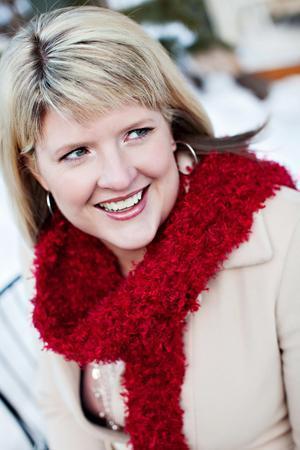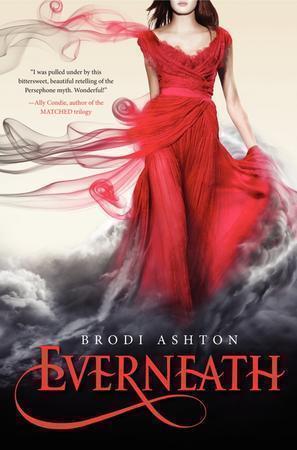
Brodi Ashton is the author of “Everneath,” the first book in a planned trilogy published by Balzer + Bray. The following is a complete transcript of her interview with Cracking the Cover.
Background — Have you always wanted to write? Why?
I was always writing for school, like for my Journalism degree and for graduate school, but I never thought it was very fun, and I didn’t think I had any sort of talent for it. But after I was finished with school, I found myself writing short stories, memories about my grandma, memories from childhood, and it became like therapy. I loved it.
It wasn’t until years later that I started to write fictional stories, and it was even longer before I finally finished a book. Finishing a book changed everything for me. It didn’t sell, or anything, but it showed me that I could do it. That’s why whenever anyone asks me for writing advice, I always say, among other things: Finish the book. Finish it. Don’t get caught in an editing loop where you never get to the end. Finish it.
Along those lines, how did you go from a bachelor’s degree in journalism and a master’s in international relations to writing?
Haha. I think I sort of answered that one in the first question. International Relations is a very cerebral and theoretical area of study. Writing fiction was a relaxing way to spend my time after that.
Why write for young readers?
It’s my favorite genre to read. And I also think teens are a challenging group to write for. You have to grab their attention from the beginning, and make your world real, no matter what that world is. They are always ready to call you on your B.S. At least, that’s what I think.
Do you have any rituals? Do you write all day?
When I’m under deadline, I can definitely write six to nine hours a day. I try not to write at night very much, because it can so easily affect my sleep and I’m a really bad writer when I’m tired. I have to unwind before I go to bed, or my brain will be all, “Hey you! You weren’t about to fall asleep, were you? Because I have this incredible idea for that big problem your main character has, and in the morning it’s going to sound really stupid, because it IS really stupid, but right now and for the next eight hours it really should be ALL YOU CAN THINK ABOUT.”
As for rituals, I like to write in the mornings, and surround my computer with bottles of Diet Coke, cups of tea, and some sort of candy, like cinnamon bears or Good ‘N Plenty. Apparently I’m the only person in the world who loves Good ‘N Plenty. Sometimes it’s not a very healthy existence, but I’m still trying to find out how to balance being a writer and being healthy.
Where did the idea for “Everneath” come from?
This question is always the most daunting, because EVERNEATH is such an amalgam of so many things in my life. My mom used to read to me from D’Aulaire’s Book of Greek Myth, and those stories stuck to me like peanut butter. And growing up, I was struck with from my mom reading to me D’Aulaire’s Book of Greek Myths, to witnessing friends from my childhood make decisions that affected the rest of their lives
How much research was involved?
There is a lot of research with every book, but I didn’t do too much because this book was never meant to be a literal retelling of any particular myth, and I didn’t want to be bound by every detail from the myth. The story, and not the myths, is the most important thing for me to tell.
How long did it take you to write?
About a year.
 How does “Everneath” differ as a published book from your first idea for it?
How does “Everneath” differ as a published book from your first idea for it?
Amazingly, it’s very similar to the book I first wrote. Probably the biggest change happened when I found my agent, and he had an idea for the ending that would involve doing something drastic. I loved it.
Once it sold, my editor and I decided to expand certain ideas, and so it ended up being much longer than the original version, but the bones of the story are very much in tact.
In the past year or so, there have been a number of different books that are built around or utilize the Persephone myth. How does “Everneath” differ? What makes it stand out?
You know, I haven’t read any of the other takes on the Persephone myth, so I can only talk about mine. It’s not a literal retelling. It started as the story of a girl who’d made a mistake and now had to return to her former life to face the consequences. I never started out saying, “Hey. How about we take Persephone, and put her in a modern high school?” I’d written much of the story before I realized that the themes were similar to themes in Persephone.
Also, a Paranormal Romance is usually defined by a human falling in love with a paranormal creature, and the obstacles they face are the differences in their makeup. Often there is a strange “attraction” between them before they even meet. But with Everneath, the true romance is between two humans, with no supernatural abilities. They fell in love over the course of years, just as normal humans would do. I wanted the romance to be grounded very much in reality, and I think that is probably the biggest way this story is different from the others out there.
Also, the real underworld is a place for the dead. The EVERNEATH only deals with the living. It doesn’t attempt to explain the afterlife.
If you only had six months left with your loved ones, what would you do?
I would just be with them. I don’t think I’d try to do any grand gestures or forced bucket lists or anything. There is such beauty in the everyday routines. I would want to spend my last days experiencing the small things that made me love them in the first place.
“Everneath” feels very personal. Was it hard to separate yourself from the characters?
Nikki’s story hit me hard, but those are the stories that are the best to write. I was very sympathetic to her, and her struggle to find the “right” course of action. That being said, it wasn’t my own personal story. But my husband will tell you that after long spells of writing, my mood could definitely be described as “in a funk”. Nikki’s story stuck with me, and I hope it sticks with readers.
This is your first published book. Is it your first novel?
No. Like many (or most) writers, I had a first novel that didn’t sell.
How has your writing evolved from when you first started until now?
I keep waiting for the point when writing becomes easy. I keep thinking, I’ve taken classes. I’ve finished three books. Shouldn’t it become routine at some point? Um… no. Every novel is difficult. Every revision kills me a little.
But when I first started writing, I collected about fifteen beginnings of books that I could never finish. I think now I can tell sooner if an idea could actually be a book, or if it should just stay as an idea.
What are you working on now?
I just turned in the latest revision for the sequel to EVERNEATH, and then when that goes off to copyedits, I’ll start on EVERNEATH 3.
What do you hope readers bring away from your book?
Whatever they want. I never wrote it with expectations of what readers would bring away. You can only think of your audience so much. That’s the fun part of being the author. All you can do is write the story you have to write, then you get to sit back and hear all the different ways it’s interpreted. It’s one of my favorite parts of the whole process so far- getting letters from readers with all the things the got out of the book. No one reader takes the same thing away!
Did you have a favorite book or book that really resonated with you as a young reader?
I had way too many favorite books as a child. I think that’s the key if you want to be a writer. Read a lot! Read as much as you can! It helps if you have parents that value reading as much as mine did.
